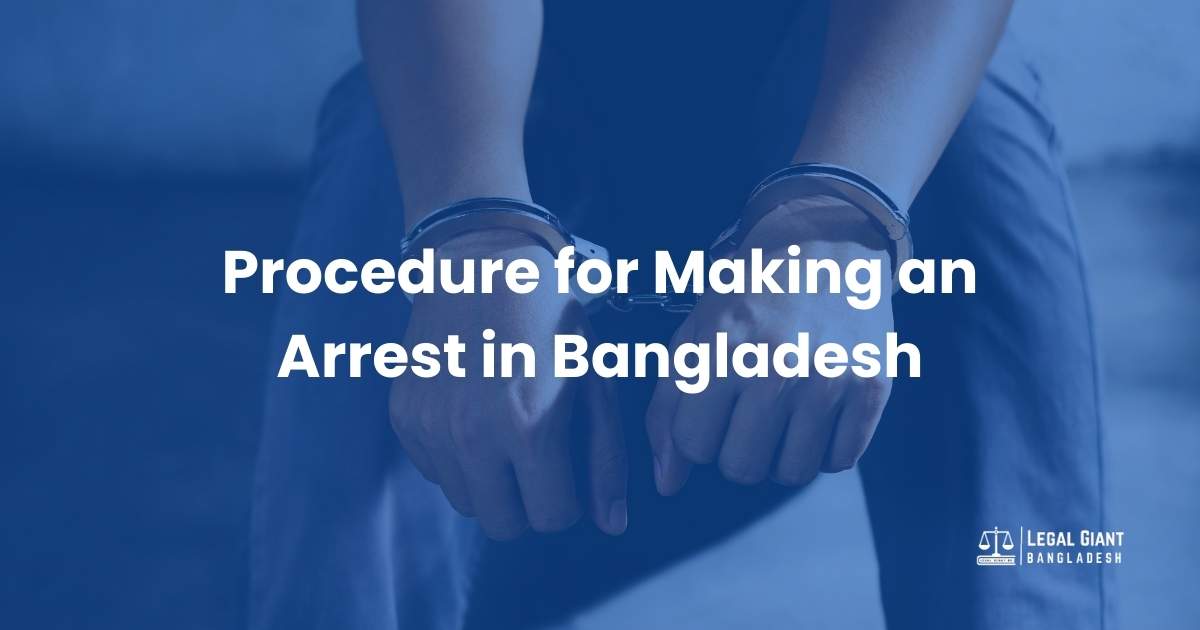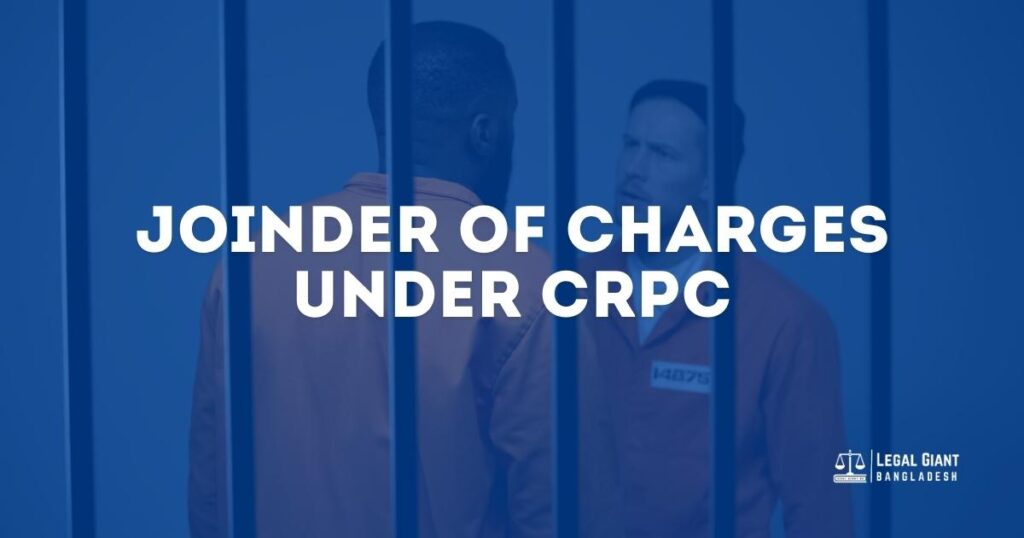Arresting a person is one of the key mechanisms through which law enforcement maintains order and ensures justice. However, the procedure for arresting Bangladesh is governed by specific laws to prevent abuse of power and to protect individual rights. This article will provide a detailed overview of the legal procedure for making an arrest as outlined in the Code of Criminal Procedure, 1898 (CrPC) and other relevant laws.

Legal Authority for Arrest
The authority to arrest someone in Bangladesh is primarily vested in law enforcement agencies, such as the police, as per the Criminal Procedure Code (CrPC), 1898. Private individuals can also make arrests under limited circumstances, as allowed by law.
Key provisions regarding arrests include:
- Section 46 of the CrPC: Describes how an arrest is to be made.
- Section 54 of the CrPC: Empowers police to arrest without a warrant under certain conditions.
- Section 151 of the CrPC: Allows preventive arrest to prevent a cognizable offense.
Types of Arrest
Arrest refers to the act of taking a person into custody to prevent or investigate a crime. In Bangladesh, arrests are classified into three main types, governed by the Code of Criminal Procedure, 1898 (CrPC):
Arrest with a Warrant
An arrest warrant is a judicial order directing law enforcement to take a person into custody.
-
- Issued by the Magistrate under Section 75 of the CrPC.
- The warrant must be in writing, signed, and sealed by the Magistrate.
Arrest without a Warrant
-
- Police can arrest without a warrant under specific circumstances listed in Section 54 of the CrPC, such as:
- When a person is involved in a cognizable offense.
- When the person has escaped from lawful custody.
- To prevent further commission of an offense.
- Police can arrest without a warrant under specific circumstances listed in Section 54 of the CrPC, such as:
Preventive Arrest
Under Section 151 of the CrPC, a person may be arrested to prevent the commission of a cognizable offense.
Procedure for Making an Arrest
The procedure for making an arrest in Bangladesh is governed by the Code of Criminal Procedure, 1898 (CrPC) and constitutional safeguards. It ensures that arrests or Detention are conducted lawfully, balancing the enforcement of justice with the protection of individual rights.
1. Identification of the Officer
- The arresting officer must identify themselves and, if not in uniform, show their identification.
2. Physical Restraint
- The officer may use reasonable force if the person resists arrest, as per Section 46(2) of the CrPC.
- Women must not be arrested or restrained by male officers unless unavoidable circumstances exist.
3. Informing the Grounds of Arrest
- Article 33(1) of the Constitution of Bangladesh and Section 50 of the CrPC mandate that the arrested person be informed of the reasons for the arrest at the time of arrest.
4. Search of the Arrested Person
- Police are authorized to search the arrested person and seize any incriminating items found.
5. Right to Inform a Relative or Friend
- The arrested person has the right to inform a family member or friend about their arrest.
6. Medical Examination
- If the arrested person requests or shows signs of injury, they must undergo a medical examination promptly.
Post-Arrest Procedure
After an individual is arrested, the law prescribes a series of steps to ensure legal compliance and protection of the arrested person’s rights. These procedures are outlined in the Code of Criminal Procedure, 1898 (CrPC) and the Constitution of Bangladesh.
1. Production Before a Magistrate
- An arrested person must be presented before a Magistrate within 24 hours of arrest as per Article 33(2) of the Constitution and Section 61 of the CrPC.
- Failure to do so may result in illegal detention.
2. Remand
- If further investigation is required, the police may seek remand, which is subject to judicial approval.
3. Right to Legal Counsel
- The arrested person has the right to consult with a lawyer, as guaranteed by Article 33(1) of the Constitution.
Legal Safeguards
To prevent misuse of arrest powers, the following safeguards are in place:
- No one can be detained beyond 24 hours without judicial authorization (Section 167 of the CrPC).
- Police must maintain an arrest register.
- Torture or coercion during custody is strictly prohibited under the Torture and Custodial Death (Prevention) Act, 2013.
Conclusion
The procedure for making an arrest in Bangladesh aims to strike a balance between enforcing the law and protecting individual rights. Awareness of these legal provisions is essential for both law enforcement officers and citizens to ensure that justice is upheld in every arrest.
FAQs
Can a Private Person Make an Arrest?
Yes, under Section 59 of the CrPC, private individuals may arrest someone committing a cognizable offense in their presence.
What Is a Cognizable Offense?
A cognizable offense is one where the police have the authority to register a case and arrest without prior approval from a Magistrate.
Can Police Arrest Anyone without A Warrant?
Yes, but only under circumstances outlined in Section 54 of the CrPC, such as preventing an immediate crime.
What Happens if The Police Fail to Produce an Arrested Person Before a Magistrate Within 24 Hours?
Failure to produce an arrested person within the stipulated time constitutes illegal detention and violates the Constitution.
Are Women Subject to Special Rules During an Arrest?
Yes, women must be arrested by female officers whenever possible, and they cannot be taken into custody after sunset unless exceptional circumstances exist.


